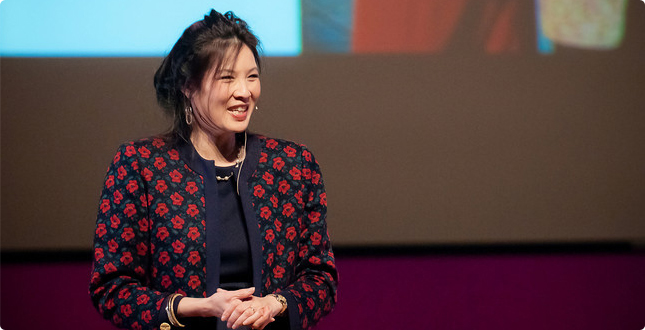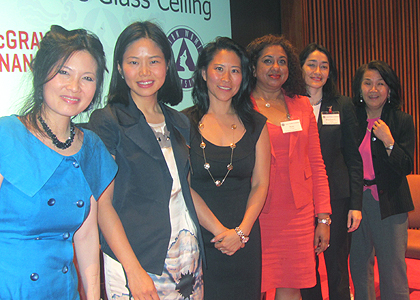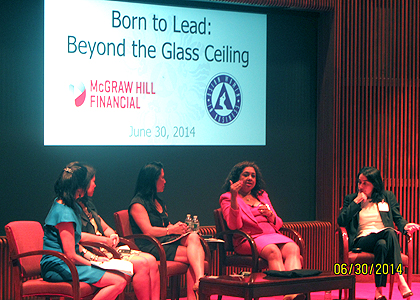By Wun Kuen Ng
Asian Women in Business hosted a panel of illustrious Asian women business leaders at the McGraw Hill Financial on June 30th, 2014. Sheryl WuDunn, Pulitzer Prize winning journalist, best-selling author and businesswoman moderated the event. The panel shared their experiences and challenges on their way to the top.
Anu Aiyengar, Managing Director of Mergers and Acquisitions at J.P. Morgan Securities LLC forged a career in the United States after her liberal arts studies at Smith College. She grew up in a protective and conservative family in India and did not want to have an arranged marriage. Then, her journey for self-determination began. She did not expect that, in the future, she would end up in Mergers and Acquisitions for fifteen years.
Aiyengar attested that Asian women are not the norm in the corporate world. People have an image of an investment banker which is very different. And especially senior Asian women is even more of anomaly and so sometimes awkward situations result. During one Japanese business meeting, she recalled being served tea last, which meant that she was perceived to be the most junior member of the team, when in reality she was the senior most person.
Sometimes being the only woman in a team has its advantages. For example, male colleagues tend to confide in a woman before a fellow male colleague. Aiyengar also have words of advice for her audience: be opinionated, outspoken and confident. Turn differences into an advantage (her accent, for instance, was a unique feature that was remembered by many clients). When asking for a promotion, know your audience and build up your internal support system. Ask for peer analyses and know your market value. Ask questions with both conviction and tact.
Martina L. Cheung, Chief Strategy Officer at McGraw Hill Financial is half Irish and half Chinese who was raised and treated equally to her three older brothers. She mentioned that the “glass ceiling” index from the Economist magazine indicated South Korea and Japan ranked poorly for working women. In response to this data, Cheung advised her audience to take control of their own careers. Besides getting mentors, she also recommended having a coach to help navigate one’s career. Being placed on a corporate board helps an employee gain management experience and also helps them give back to the company. She also admits that her leadership style has changed over the years. As a management consultant, she started out with an aggressive leadership style that later changed to a more collaborative style.
Susan Soh, Partner Head of Marketing and Client Services at Perella Weinberg Partners was raised by “tiger parents”. She met the expectations of her parents by becaming valedictorian, attending an Ivy League, and obtaining a 4.0 GPA at Harvard Law school. A shy kid growing up, she developed her tough exterior through debate team, college and law school. She encourages women to speak up, have something to say, get things done, work hard and smart and be open to opportunities. Despite her stellar track record, she also warns against aiming for perfection. She says that nobody should try to be perfect, so long as they always strive for anything “above 80%”.
Soh eventually found her passion and her significant other through her current job. Her husband has been staying at home for one year. She was five months pregnant when she was hired. To be a role model for other women in her firm, she took more than one month of maternity leave to get her support system in place so she can work more effectively. In a male dominated environment, she advised to be outspoken and stand tall in order to be seen.
Julie Yoo, SVP of Corporate Development at Scripps Networks Interactive suggests using honesty to your advantage. She left South Korea because of the country’s discrimination against women. Her advice on dealing with racism is to face it directly and to know your rights and boundaries. She recalled a time when she was in front of a group of associates at a meeting, when a partner asked her why she does not wear a skirt. The next day she went to his office and spoke to him. She told him how offended she was by his remark, shocking her male coworker by her comment. In her career, she picked an area to focus on and gained visibility. At Scripps, there are only a dozen Asians out of 2,500 employees. Four of them work in her department.
In retrospect, the panel offered a lot of wisdom and helpful advice for many of the young professionals in the audience. Hopefully their advice will help empower both minorities and women in the corporate world so that the “glass ceiling” will cease to exist in the future.



Leave a Reply